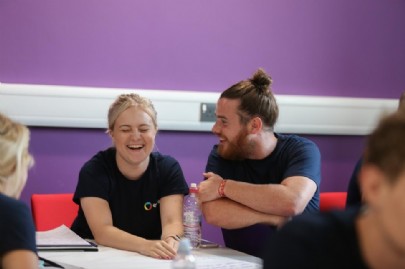Youth mentoring typical considers the physical and emotional health of the children. But what about their cognitive health? Joshua Cronin is the managing director at Evolve: A Social Impact Company. Evolve is a mentoring organization focused on school children in the UK. According to Joshua, a lot of children can’t access education for several reasons; social, economic and mental health challenges. Evolve aims to help these young people by prioritizing their physical, emotional and cognitive well-being as the priority, and enable them to live a successful life in the future. Evolve works around 80% of their time with children from primary school age by providing them with health mentors and programmes. The mentors themselves are paid as professional jobs and run series of interventions aimed at improving the physical health of the children and their emotional well-being to support their mental health. The mentoring organization is now exploring ways on how to improve their cognitive brain health.
And how does Evolve reach out to these school students? Mainly through referrals from schools they work with as well as through projects targeted towards specific schools. The mentoring programmes can challenge such as the children’s behaviour, attendance or academic attainment. The students themselves are assessed using a tool (set of questions) called the well-being compass. The well-being compass was developed at Evolve based on the Mental Wellbeing Scale which asks questions about young people’s mental health. This takes a look at several domains of the child’s wellbeing; their sleep, nutrition, physical well-being, emotional well-being and cognitive well-being. This survey is handed out to all the children at school and the scores are used to identify who they work with and what areas of their well-being will need to be addressed. The survey is repeated every 2-3 months to track the children’s progress and ensure that the right interventions are being used. The goals of these programmes depend mainly on the projects they have at multiple schools along with the general targets they work towards. Besides agreements made with the schools, mentoring agreements are also agreed upon between the mentors and the mentees.
They do not have many strict academic pre-requisite conditions for recruiting mentors since the programmes are focused more on the lived experience of the person and their ability to empathize with the experience of the children. Joshua reasons that “those that have got greater academic qualifications tend to know more the theory about it rather than the practicalities of it, sometimes struggle to make the change from learning about it and writing about it theoretically to carrying the work out practically.” The selection and training process for the mentors at Evolve includes a three-stage training programme. The first stage called the health mentor training programme looks at the fundamentals of mentoring (basic mentoring principles, basic physical activity principles and cognitive well-being) and everything else needed to imbed the mentors in the school. The second stage is more detailed where the mentors are given a specific research project to conduct within a school. They are given a specific research project within a school to conduct and look at developing a product, a programme or a scheme of work that is specifically targeted at a specific area of their school, or their young people’s needs. The third stage of the programme is for those mentors who don’t have a masters’ degree or wants to get another one. It involves an extended research programme over two years in partnership with a university. Therefore, Evolve provides people with not only a job but also training and investment which they can use in their future careers.
And what does Evolve see in its future? This would be the work they do on improving the cognitive functions of the students. Currently, they are working with a partner in America; Posit Science who has developed a mobile app BrainHQ. This app has been proven to reduce the physical damage to the child’s brain which might be caused by adverse childhood experiences. Joshua hopes that using technology-based interventions such as this app as part of their programmes can be used to maximize the effect size of their interventions. They are now running a couple of pilot programmes to trial this app in the UK over the next 12 months. Evolve thinks that it could be a “real game-changer for the world of children and young people in terms of making a significant impact on their lives.”
